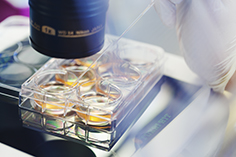Open Positions and Study Opportunities
NORPOD - Postdoctoral Researcher Programme
The NordForsk-funded NORPOD program of the Nordic EMBL Partnership aims to nurture the next generation of scientists whilst promoting research collaborations in molecular medicine across the Nordics and beyond for human health. The four Nordic EMBL nodes work in partnership with the European Molecular Biology Laboratory (EMBL) and its sites throughout Europe thus, encouraging competence building and engagement with its research networks.
Visit our dedicated page for NORPOD to learn more.
The third NORPOD call will open in June 2025.
Opportunities for researchers displaced from Ukraine
A variety of funding and study opportunities have been made available in Denmark, Finland, Norway and Sweden. We encourage researchers displaced from Ukraine to look into these opportunities. This list will be updated as new information is available.
In addition, we encourage researchers to search EMBO's Solidarity List where groups from around the world and within the Nordic EMBL Partnership have also posted specific opportunities, GitHub's collation of resources, and the Science for Ukraine initiative and to follow the Scholars at Risk Network where some of our host universities participate.
Denmark
- Ukraine Research Fellowships
- Information about the introduction of special legislation for people displaced from Ukraine (in Danish)
- Information about tuition relief for higher education programs in Denmark (in Danish)
Finland
- Kone Foundation: How we support researchers from Ukraine
- The Finnish Society of Sciences and Letters Open Call for Grants for Ukrainian Researchers in Finland
- Study at Finnish universities
Norway
- Information about support for academic departments at the University of Oslo hosting researchers from Ukraine
- Information for Ukrainian, Belarusian and Russian students applying for financial support through a Norwegian grant scheme




